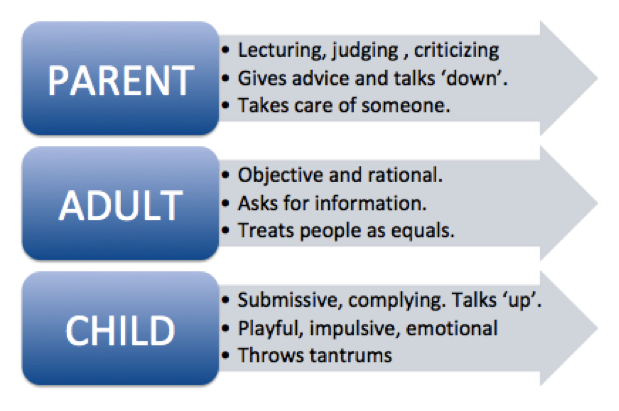The Parent-Adult-Child model
Eric Berne’s Parent-Adult-Child model helps us shed light on the communication patterns that people use and assists us in building better relationships at work. Berne devised the concept of ego states to help explain how we are made up and how we relate to others. The starting point of his model is that every time two people encounter each other, they will communicate from one of three ego states called Parent, Adult and Child. These labels don’t necessarily correspond to how we use them in common English. When we say Parent ego state, for instance, we don’t mean that you are a parent, but that you act with that psychological mind-set. Each of the three ego states relate to how different parts of our personality think, feel and behave. The more aware we become of our own state, the easier it becomes to choose our responses so that we neither talk up or down to someone. If we are not aware of our state, we could be responding inappropriately, and thereby damage relationships or aggravate a conflict. Let’s look at each of the three ego states in turn.
When we operate from the Parent state, we are typically lecturing, judging or criticising others and focusing on identifying problems. Directive managers who make extensive use of authority and give little freedom to their teams often act from this state. They might say: ‘What? It takes five days to generate the report?’ and it could be accompanied by folded arms or furrowed brows. But the Parent state can also show itself in someone who is overprotective and takes care of others. They might say, ‘Let me take care of that for you.’ In this case a manager may make plans on behalf of their team and fail to seriously take on board the team’s input. The manager doesn’t fully trust that the team is capable and responsible and therefore acts like a caretaker. In summary, the Parent ego state minimises others and treats them as less capable.
The Child ego state is in many ways the opposite of the Parent state in that it’s either submissive and compliant or rebellious and carefree. The Child state represents the emotional part of our beings, which encompasses playfulness and spontaneity, but also anger, despair and depression. When strong emotions such as anger, sadness or fear dominate reason, the Child ego state is in control. It will mostly come to light as a reaction to someone who speaks from the Parent state. For instance, if the manager says: ‘What? It takes 5 days to generate the report?’ the team member might reply in a submissive way saying; ‘Sorry. I’ll try to speed it up. In other words they comply with the Adults’ expectations and see the other person’s needs as being more important than their own. But there is another way in which the Child state can reveal itself, for instance if the team member rebels and responds: ‘Yea – you’ll get it in 5 days if you’re lucky!’ Although the dialogues may be exaggerated, they illustrate that neither the Parent nor the Child ego states are useful for building relationships at work. Instead these communication patterns reinforce deeply dysfunctional ways of responding to each other.
To build constructive and enduring relationships you have to treat people as equals and communicate with stakeholders based on analysis and facts rather than preconceived ideas. Put in another way, you shouldn’t let your own filters and emotional reactions hijack a conversation. This is an area where we really need to make use of our emotional intelligence and our ability to self-regulate. The third ego state – the Adult – can helps us do so.
The Adult ego state is the independent part of us, which is able to think and determine actions for ourselves and make rational decisions based on facts. It represents our primarily intellectual ego that helps us deal with situations in ways that are not negatively influenced by our past. When we operate from our Adult state we are objective, rational and less emotional. We see people as they are rather than what we project onto them. Instead of making assumptions and reacting in an emotional way, we ask for information and we solve problems based on logic and facts.
In the Adult state managers who want to challenge somebody might say, ‘What are the alternatives?’ or ‘What consequences will this action have?’ They engage their team and give them the freedom to participate in problem solving because they trust that they are capable and responsible. The emphasis here is on an environment with free information flow, which is conducive to self-development and where people can utilise their potential.
If you’re unhappy with a team member’s contributions, refrain from talking down to them. Instead, challenge them with a logical and data driven approach, where you treat them as equals. Likewise, if someone talks down to you, don't automatically respond from the Child state but use the Adult pattern. How can you do that? By staying calm and rational. If a manager provokes you by saying: ‘What? It takes 5 days to generate the report?’ You could respond. ‘I see that this is not what you expected. What problem does this cause for you? Let me explain the work we have to do on our side and we can see if we can find a solution.’
In which project situations would you say that you communicate either from a Parent or Child state? How can encourage Adult-to-Adult communication throughout the team?
If you liked this post, you may also like:
Every interaction with your team is an opportunity to increase the connection
10 tips for handling conflict
Top Tips for Providing Effective Feedback
Overcoming resistance to change
The Most Common Communication Mistakes Project Managers Make









 RSS Feed
RSS Feed